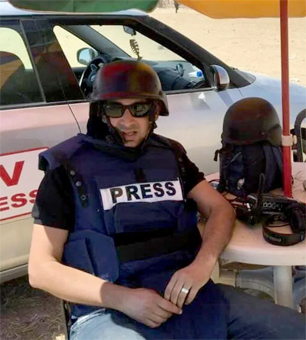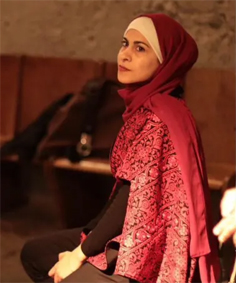|
CRY FREEDOM.net
formerly known as
Women's Liberation Front
MORE INSIGHT MORE LIFE
Welcome to cryfreedom.net,
formerly known as Womens
Liberation Front.
A website
that hopes to draw and keeps your attention for both the global 21th. century 3rd. feminist revolution as well
as especially for the Zan, Zendegi, Azadi uprising in Iran and the
struggles of our sisters in other parts of the Middle East. This online magazine
that started December 2019 will
be published every week. Thank you for your time and interest.
Gino d'Artali
indept investigative
journalist
radical feminist and women's rights activist
'WOMEN, LIFE, FREEDOM'
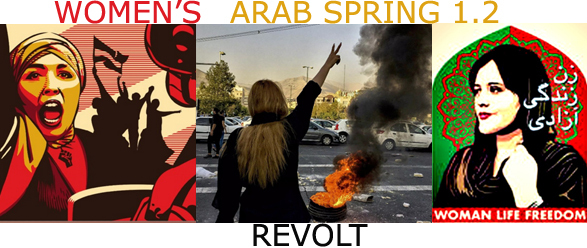
You are now at the section on what is happening in the rest of the Middle
east
(Updates
June 21, 2024)
Click here for the Iran 'Woman, Life, Freedom'
section
For the 'Women's Arab Spring 1.2' Revolt
news
click here
CLICK HERE ON HOW TO READ
ALL ON THIS PAGE
|
SPECIAL
REPORTS PALESTINE
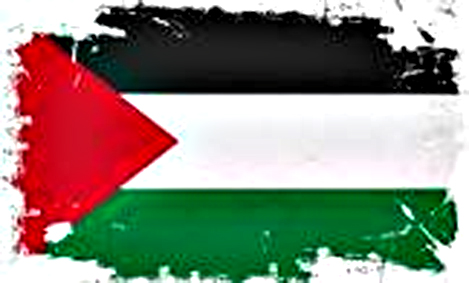
FROM THE RIVER TO THE SEA - FREE PALESTINE
with special thanks to citizen-reporter 'Biba'
(Algeria)
June wk4 --
June wk3 P2 --
June wk3 --
June wk2 part3
--June wk2 part2 --
June wk2 -- Click here for an overview by week in 2024
|
June 24 - 22, 2024
<<Israeli
soldiers strapped injured Palestinian to jeep after West
Bank arrest raid...
Inhumanity does have a face...
i.e. Tyrants and killers are of all times. And always
thinking the highest of themselves.
But in the the end they always fall. Mahatma Ghandi
and more news but most with a 'give way or go away'
yell!
Next update Thursday June 27, 20.00 hours GMT
June 22 - 20, 2024
Food for thought on the
below headlines:
"Hamas |or the Palestinians| cannot be eliminated |nor genocided| |
June 19 - 17, 2024
<<'A slow death': Gazans
live alongside rotting rubbish and rodents...
and <<Live: Israel's
actions in Gaza may have violated laws of war, UN rights
office says...
and <<Live: UN says unable
to deliver aid to Gaza despite Israel's military
'pause'...
and <<Israel-Lebanon: A
funeral for two women shows how furious fighting is
ratcheting up the risk of all-out war...
and <<Israeli protesters
demand new elections after war cabinet dissolution...
and <<'Judging Putin and
Netanyahu necessarily implies a fair and adversarial
trial'...
and more news but most with a 'give way or go
away' yell!
Next update Sunday June 22, 20.00 hours GMT |
June 16 - 12, 2024
<<Israeli army says eight soldiers
killed in armoured vehicle in southern Gaza...
and
<<Two women killed in Israeli airstrike on South
Lebanon...
and <<UNICEF's James Elder
says Gaza a 'horror show' for children...
and <<Gaza is in dire need
of women's health services...
and <<American brands in
Middle East under pressure from Israel boycotts...
and <<Hamas rebuffs Blinken
blame for elusive ceasefire...
and <<In the chaos of Gaza,
merchants take up arms to deliver food...
and <<Three Jordanian
doctors' account of Gaza's descent into hell...
and more news but most with a 'give way or go
away' yell!
Click here to go throughout June and earler, 2024 |
When one hurts or kills a women
one hurts or kills hummanity and is an antrocitie.
Gino d'Artali
and: My mother (1931-1997) always said to me <Mi
figlio, non esistono notizie <vecchie> perche puoi imparare qualcosa da
qualsiasi notizia.> Translated: <My son, there is no such thing as so
called 'old' news because you can learn something from any news.>
Gianna d'Artali.
BBC - June 19, 2024 - By Yolande Knell
<<'A slow death': Gazans live alongside rotting rubbish and rodents
Across the Gaza Strip, in a landscape newly transformed by war,
mountains of stinking rubbish pose severe dangers to health and the
environment.
<We've never lived next to rubbish before,> says Asmahan al-Masri, a
displaced woman, originally from Beit Hanoun in the north, whose home is
now a wasteland in Khan Younis. <I cry just like any other grandmother
would over her grandchildren being sick and having scabies. This is like
a slow death. There is no dignity.> In eight months, more than 330,400
tonnes of solid waste are estimated to have built up in the Palestinian
territory, according to the UN and humanitarian agencies working on
sanitation. Sixteen members of the Masri family share a tent in a camp
near al-Aqsa University with clouds of flies and sometimes snakes. Stray
dogs can roam menacingly nearby. All the residents complain of the
constant stench. <The smell is very disturbing. I keep my tent door open
so that I can get some air, but there is no air,> Asmahan says. <Just
the smell of rubbish.> Some of the more than one million people who
recently fled Israel's military offensive in the southern city of Rafah
have been forced to live in open areas that had already been turned into
temporary refuse tips.
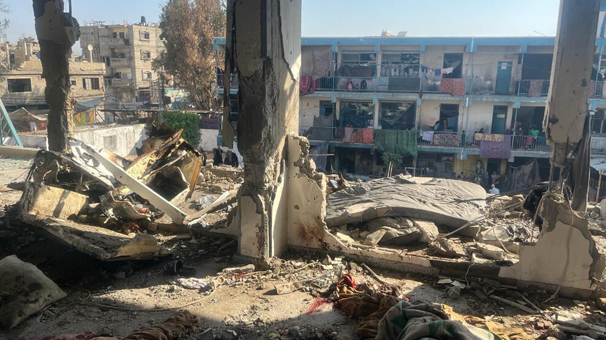
Children die every day
<We searched everywhere for a suitable place, but we are 18 people with
our children and grandchildren, and we couldnít find anywhere else where
we could stay together,> says Ali Nasser, who recently moved to the al-Aqsa
University campsite from his home in Rafah. <The journey here cost us
over 1,000 shekels ($268; £212) and now our finances are destroyed. We
have no jobs, no income, and so we are forced to live in this dire
situation. We suffer from vomiting, diarrhoea, and constantly itchy
skin.>
Before the war, years of blockade imposed by Israel and Egypt on Gaza,
which was governed by Hamas, had put a severe strain on basic services,
such as waste disposal. The tight restrictions for what Israel said were
security reasons on what could enter the territory meant there were
insufficient rubbish trucks, a lack of equipment for sorting and
recycling household waste and for disposing of it correctly. Since the
deadly 7 October Hamas-led attacks, Israelís military has blocked access
to the border area, which is where Gaza's two main landfill sites are
located. One in Juhr al-Dik previously served the north, and another, in
al-Fukhari, served the central and southern areas. <We're seeing a waste
management crisis in Gaza, and one that has got a lot worse over the
past few months,> says Sam Rose, director of planning for the UN agency
for Palestinian refugees, Unrwa. Gazans face the risk of disease with
sewage water accumulating close to makeshift shelters Social media
footage compiled by BBC Verify shows temporary waste dumps have grown as
people have fled in waves to different towns and cities. BBC Verify has
authenticated these locations in Gaza City, Khan Younis and Rafah from
February to June this year. Satellite analysis by BBC Verify has
previously shed a light on another aspect of sanitation problems,
showing half of Gaza's water and sewage treatment sites have been
damaged or destroyed since Israel began its military action against
Hamas. <You see massive pools of grey-brown sludge around which people
are living because they have no choice, and you see large piles of
garbage. Either this is just left outside peopleís homes or in some
places, people have been forced to move near the temporary landfills
that have been set up,> Mr Rose says.
<People are literally living amongst the garbage.>
The mass displacement of people has overwhelmed local authorities often
dealing with damaged facilities because of the ongoing Israeli
bombardment. They complain of a lack of staff, equipment, and rubbish
trucks as well as fuel to run them.>>
Source:
https://www.bbc.com/news/articles/cy66w5ppnp7o
France 24 - June 19, 2024 - By THE DEBATE - Rebecca GNIGNATI|FranÁois
PICARD|Alessandro XENOS|Melissa KALAYDJIAN
<<Netanyahu on all fronts: Can Israel keep up war in Gaza while taking
on Hezbollah?
There has been no ceasefire in Gaza since November. And just as tensions
were subsiding a little, fears are now growing over Lebanon. We ask, in
light of the latest border incidents, whether initial fears of an
all-out war between Israel and Hezbollah could still prove true.
In hindsight, Iran's first-ever direct missile attacks on Israel back in
April seemed like a symbolic gesture, but it certainly got Binyamin
Netanyahu's top brass's attention. The same top brass is at loggerheads
with the prime minister over the lack of an exit strategy in Gaza.
Netanyahu has managed to steady his political ship despite foreign and
domestic pressure to resign, to the point where he can do without the
opposition in a unity war cabinet. By dissolving that war cabinet, he's
stared down his own far-right coalition partners. But for how long? And
how long can the rest of the world feel the spillover? In France, eight
months of war in the Middle East have strained political alliances to
the point where divisions could prove a factor in crucial snap
legislative elections where every vote counts.>>
Read more here and video:
https://www.france24.com/en/tv-shows/the-debate/20240618-netanyahu-on-all-fronts-can-israel-keep-up-war-in-gaza-while-taking-on-hezbollah
France 24 - June 19, 2024
<<Live: Israel's actions in Gaza may have violated laws of war, UN
rights office says
Israeli forces may have violated fundamental principles of the laws of
war on repeated occasions and failed to distinguish between civilians
and fighters in their Gaza military campaign, the UN human rights office
said Wednesday. The same office said last week that the killing of
civilians during an Israeli operation to free four hostages could amount
to war crimes, but so might Palestinian militants' holding of captives
in densely populated areas.
Summary
Israeli forces may have repeatedly violated fundamental principles of
the laws of war and failed to distinguish between civilians and fighters
in their Gaza Strip military campaign, the United Nations human rights
office said on Wednesday.
Israel's military on Tuesday said it had <approved and validated>
operational plans for a Lebanon offensive amid escalating cross-border
tensions between Israel and Hezbollah.
The US does not want to see a wider regional war in the Middle East,
said a Pentagon spokesperson shortly after the Israeli army said it had
approved operational plans for an offensive in Lebanon.>>
Read more and video here:
https://www.france24.com/en/middle-east/20240619-%F0%9F%94%B4-live-un-says-unable-to-deliver-aid-to-gaza-despite-israel-s-military-pause
France 24 - June 19, 2024
<<Live: UN says unable to deliver aid to Gaza despite Israel's military
'pause'
The United Nations said on Tuesday it has been unable to distribute aid
in the Gaza Strip from the Israel-controlled Kerem Shalom crossing
because of lawlessness and panic among hungry people in the area,
despite Israel's daytime pause in military activity. Israel's military
said on Sunday there would be a daily pause in its attacks from 0500 GMT
until 1600 GMT until further notice along the road that leads from
Israel via the Kerem Shalom crossing to the Salah al-Din Road and
northwards in Gaza.
Summary
Israel's military on Tuesday said it had <approved and validated>
operational plans for a Lebanon offensive amid escalating cross-border
tensions between Israel and Hezbollah.
The US does not want to see a wider regional war in the Middle East,
said a Pentagon spokesperson shortly after the Israeli army said it had
approved operational plans for an offensive in Lebanon.
Yemen's Houthi militants are believed to have sunk a second ship, the
Tutor, in the Red Sea, the United Kingdom Maritime Trade Operations (UKMTO)
said on Tuesday.>>
Read more and view video here:
https://www.france24.com/en/middle-east/20240619-%F0%9F%94%B4-live-un-says-unable-to-deliver-aid-to-gaza-despite-israel-s-military-pause
France 24 - June 18, 2024 - By: NEWS WIRES
<<Live: French court rules against 'discriminatory' Israeli ban from
arms expo, says lawyer
A French court on Tuesday ordered organisers of a defence trade show to
suspend a ban on Israeli firms, according to a lawyer for the
Franco-Israeli Chamber of Commerce. Organisers of the Eurosatory trade
show near Paris said French authorities had banned Israeli firms, with
the French defence ministry attributing the decision to Israel's
military operations in the Gaza Strip's Rafah city.
Summary
Israeli strikes on Tuesday killed at least 13 people in central Gaza,
the civil defence agency in the Hamas-run territory said. Witnesses
reported gunfire and artillery shelling near Nuseirat refugee camp where
separate deadly strikes on a family home and a commercial building were
also reported. A French court on Tuesday ordered organisers of the
Eurosatory defence trade show to suspend a ban on Israeli firms,
according to a lawyer for the Franco-Israeli Chamber of Commerce.>>
Source and read more incl. video:
https://www.france24.com/en/middle-east/20240618-%F0%9F%94%B4-live-gaza-fighting-slows-during-pause-but-israel-operations-continue-as-planned
Sky News - June 17, 2024 - by Alex Crawford | Special correspondent
<<Israel-Lebanon: A funeral for two women shows how furious fighting is
ratcheting up the risk of all-out war
The increasingly furious and dangerous skirmishes on the
Lebanese-Israeli border are reaching deeper into rival territories -
with the odds of all-out war in the region shortening. The gunfire rang
long and loud. We watched as angry and tearful men fired into the air
chanting death threats against Israel and America in Deir Qanoun En Nahr
in southern Lebanon. Ambulance sirens wailed and crowds of young
Lebanese female medics stood holding pictures of their colleague, their
faces creased in pain and sorrow. We've been to many funerals recently.
This was the ceremony for two civilians, both women - one a mother, the
other an emergency medic in her twenties. They are the latest civilian
victims to be killed in Israeli border attacks.
There's terror on the other side of the border too, in Israel, with a
marked escalation in the quantity and range of attacks from the
Iran-backed Lebanese militant group, Hezbollah. The increasingly furious
and dangerous skirmishes on the Lebanese-Israeli border are becoming
deeper in territory and longer in range and the odds of all-out war in
the region have correspondingly shortened. The situation has become so
alarming that the two top United Nations officials in Lebanon have
warned they are deeply concerned about the recent clashes along the
southern border. The weekend statement from the UN Special Co-ordinator
for Lebanon, Jeanine Hennis-Plasschaert, and Aroldo Lazaro, the head of
the UN peacekeeping forces in Lebanon, warned: <The danger of
miscalculation leading to a sudden and wider conflict is very real.> And
they urged <all actors to cease their fire and commit to working toward
a political and diplomatic solution>. Right now, though, neither side
seems willing to back down while reiterating they don't want war but
they're ready for it. And it seems the communities suffering on both
sides are encouraging this approach. Around 90,000 people have had to
flee their homes in northern Israel while Lebanese authorities say
100,000 have been displaced from the southern border.
They're angry, homeless and they want their lives back. They want to
return.
'She was my only daughter'
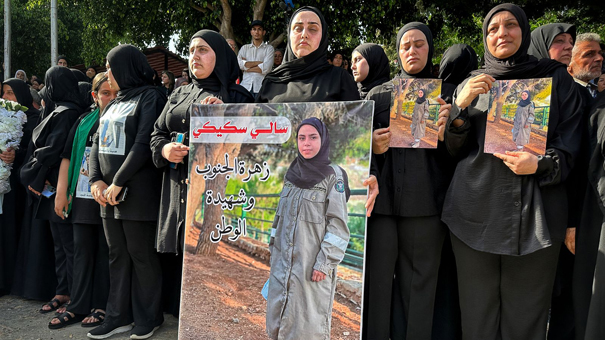
Grieving relatives hold a photo of killed medic Sally Skeiky
The Lebanese father of 25-year-old medic Sally Skeiky told us by his
daughter's grave in Deir Qanoun En Nahr that he wanted revenge, too. <I
believe her death is a necessary sacrifice,> Hussein Skeiky told us.
<She was my only daughter. But everyone thinks about this... what can we
do? My country needs us now.> He went on to voice what many Lebanese
people feel. <I want to remove our enemy [Israel] from this country.
This enemy beside us is very dangerous...we need to remove him from
here. There are people now making the fight with our enemy and we want
to help them.> <Do you mean revenge?> I asked him. <Yes,> he replied. In
Israel too, those forced out of their homes - after Hezbollah opened up
a second front following the Hamas attacks last October - are
pressurising the authorities to secure the border. The cross-border
escalation prompted senior Israel Defence Forces (IDF) spokesman Daniel
Hagari to say on Sunday: <Since deciding to join the war that Hamas
started on 7 October Hezbollah has fired over 5,000 rockets; anti-tank
missiles and explosive UAVs from Lebanon at Israeli families, homes, and
communities.> And he went on to warn: <Hezbollah's increasing aggression
is bringing us to the brink of what could be a wider escalation - one
that could have devastating consequences for Lebanon and the entire
region.> And that is what the US envoy Amos Hochstein is flying into. Mr
Hochstein is an experienced negotiator and has been working behind the
scenes for months now - trying to de-escalate tensions. But he has his
work cut out for him. He flew into the region as news emerged of another
Hezbollah commander killed in an IDF strike on a car near the southern
Lebanese town of Tyre on Monday.
It comes on the heels of the worst week of skirmishes on the
Israeli-Lebanon border since the start of the Gaza war in October. The
IDF killing of the most senior Hezbollah commander since October led to
furious retaliation by Hezbollah who fired hundreds of rockets and
drones into Israeli villages and towns - the most in a single day since
October. Analysts and experts have until now banked on both Hezbollah
and the Israelis fearing they had far more to lose than to gain by
all-out war.
Now they're not so sure.>>
Source incl. video:
https://news.sky.com/story/israel-lebanon-a-funeral-for-two-women-shows-how-furious-fighting-is-ratcheting-up-the-risk-of-all-out-war-13154509
France 24 - June 18, 2024
<<Israeli protesters demand new elections after war cabinet dissolution
Thousands of Israelis on Monday protested against Israeli Prime Minister
Binyamin Netanyahu's government, demanding new elections at the start of
a <week of disturbance> call by activists. The protests came hours after
Netanyahu dissolved the war cabinet that was tasked with steering the
war in Gaza.
Summary:
Israeli Prime Minister Binyamin Netanyahu on Monday dissolved the war
cabinet and is now expected to hold consultations about the Gaza war
with a small group of advisers, including Defence Minister Yoav Gallant.
Thousands of Israelis protesting outside parliament and Prime Minister
Netanyahu's residence in Jerusalem on Monday called for new elections at
the start of a <week of disturbance> call by activists.
US presidential special envoy Amos Hochstein on Monday held talks with
top Israeli leaders to press for a de-escalation on the Lebanese
border.>>
Source, video and read more here:
https://www.france24.com/en/middle-east/20240617-%F0%9F%94%B4-live-senior-joe-biden-advisor-due-in-israel-to-avoid-escalation-with-hezbollah-lebanon-hamas-war-palestinian-territories
Le Monde - June 17, 2024 - by Sandrine de Sena | Legal consultant before
the ICC
<<'Judging Putin and Netanyahu necessarily implies a fair and
adversarial trial'
While the two leaders do not recognize the authority of the
International Criminal Court, Sandrine de Sena, legal consultant before
the ICC, analyzes the options that would enable them to be judged
fairly, even in their absence.Published today at 10:45 am (Paris),
updated at 12:28 pm 3 min read
On May 20, 2024, Karim Khan, the prosecutor of the International
Criminal Court (ICC), filed applications for warrants of arrest before
Pre-Trial Chamber I in the Situation in the State of Palestine. At
first, many thought that the arrest warrants had been issued, before
realizing that it is now up to the judges to accede, in whole or in
part, to Karim Khan's request.
The task is not a simple one, and the responsibility resting on the
shoulders of the judges is a heavy one. They now have little room for
maneuver in rejecting the request made public by the prosecutor. In
principle, it is rare at this stage to communicate on the mere filing of
motions. But this is clearly an unprecedented situation, one on which
the Court is particularly eager to act, and where the future of
international criminal justice is at stake more than ever.
Read more Subscribers only Israel's shadow war against the ICC, between
threats and surveillance
Assuming that the arrest warrants are issued, we will have to rely on
the cooperation of the ICC's 124 States Parties to arrest the suspects
if they happen to be in one of their territories. Everything will depend
on the goodwill of the States.
Opening 'the door to everything'
In the most likely event that the suspects are not arrested (as can be
seen from the difficulty the Court is still having in apprehending Omar
Al-Bashir), how will they be tried? A number of voices are calling for
trials in absentia. A group of practitioners, led by Catherine Mabille,
Bruno Cotte and FranÁois Roux, proposes to amend the Rome Statute [the
treaty that created the ICC] to include the possibility of judging in
absentia. According to Julian Fernandez and Serge Sur, the inability of
the ICC to judge in absentia condemns it "to the role of an engaged
spectatorĒ [in an op-ed in French published in Le Monde]. In the end,
many agreed on the need to do something.
In practice, however, the mere mention of amending the Rome Statute has
always frightened the majority of those involved in international
criminal justice. Amending the Statute would open "the door to
everything," and above all the exit door: Many States would prefer to
withdraw from the legal instrument. These arguments were justified when
the Court fell into disuse and disappointment.
Renewed interest in international criminal justice and the ICC has never
been greater, and dashed hopes have been rekindled. Assuming that the
Rome Statute is amended, how would then be judged Putin or Netanyahu,
two leaders who are both firmly opposed to the Court and do not
recognize its authority? Judging them necessarily implies a fair and
adversarial trial. How, then, can such a trial be envisaged, and how can
its legitimacy be ensured, without the presence and support of the
accused?>>
Source and read more here:
https://www.lemonde.fr/en/opinion/article/2024/06/17/judging-putin-and-netanyahu-necessarily-implies-a-fair-and-adversarial-trial_6674979_23.html
BBC - June 17, 2024 - By Yolande Knell - BBC Middle East correspondent
<<Israeli PM scraps war cabinet after key departures
Benjamin Netanyahu had faced demands from far-right ministers to join
the war cabinet
Israelís Prime Minister Benjamin Netanyahu has dissolved his six-member
war cabinet, a widely expected decision that follows the departure of
centrist opposition leader Benny Gantz and his ally Gadi Eisenkot.
Israeli media report that sensitive issues about the war with Hamas in
Gaza will now be decided by a smaller forum. Since Mr Gantz quit eight
days ago over what he said was the lack of strategy for the war, there
have been calls from far-right ministers to take his place. By
dissolving the war cabinet, Mr Netanyahu avoids a tricky situation with
his coalition partners and international allies. A spokesman for the
Israel Defense Forces (IDF) said that, as far as it was concerned, it
would not affect the chain of command.
Mr Gantz and Mr Eisenkot joined a national unity government with Mr
Netanyahu's right-wing coalition days after the start of the war in
October.
The two former IDF chiefs of staff announced their resignations on 9
June, with Mr Gantz saying that the prime ministerís leadership was
<preventing us from approaching true victory>. Immediately afterwards,
far-right National Security Minister Itamar Ben-Gvir said he had written
to Mr Netanyahu to demand that he be added to the war cabinet. On Sunday
night, Mr Netanyahu reportedly informed ministers that he had decided to
dissolve the decision-making body rather than bring in new members. <The
[war] cabinet was in the coalition agreement with Gantz at his request.
As soon as Gantz left - there is no need for a cabinet anymore,> he
said, according to the Jerusalem Post. Haaretz reported that some of the
issues previously discussed by the war cabinet would be transferred for
discussion in the 14-member security cabinet, which includes Mr Ben-Gvir
and fellow far-right Finance Minister Bezalel Smotrich. It said
sensitive decisions would be addressed in a <smaller consultation
forum>, which was expected to include Defence Minister Yoav Gallant,
Strategic Affairs Minister Ron Dermer and the chairman of the
ultra-Orthodox Shas party, Aryeh Deri. The three men were in the war
cabinet along with the prime minister, Mr Gantz and Mr Eisenkot. The
IDF's chief spokesman, Rear Admiral Daniel Hagari, insisted on Monday
that such moves would not affect its operations. <Cabinet members are
being changed and the method is being changed. We have the echelon, we
know the chain of command. We're working according to the chain of
command. This is a democracy,> he told reporters.
The Israeli military launched a campaign in Gaza to destroy Hamas in
response to an unprecedented attack on southern Israel on 7 October,
during which about 1,200 people were killed and 251 others were taken
hostage.
More than 37,340 people have been killed in Gaza since then, according
to the territory's Hamas-run health ministry.
There have been further signs of strain in the Israeli government in the
past day, with Mr Netanyahu and his far-right ministers criticising a
decision by the IDF to introduce daytime <tactical pauses in military
activity> near the southern Gaza city of Rafah to allow more deliveries
of humanitarian aid. The pauses are meant to allow lorries to collect
aid from the Israeli-controlled Kerem Shalom border crossing, south-east
of Rafah, and then travel safely to reach the main north-south road
inside Gaza. Supplies have been held back at the crossing point since
Israel began an operation in Rafah last month. But Mr Ben-Gvir decried
the policy as foolish, while Israeli media quoted Mr Netanyahu as
saying: <We have a country with an army, not an army with a country.>
The IDF responded by saying that the pauses did not mean the fighting in
southern Gaza would stop, which created confusion over what exactly was
happening on the ground.
The UN agency for Palestinian refugees (Unrwa), which is the largest
humanitarian organisation in Gaza, reported that fighting was continuing
in Rafah and elsewhere in the south on Monday and that <operationally
nothing has changed yet>. The IDF meanwhile said that its troops were
<continuing intelligence-based, targeted operations in the area of Rafah>.
It added that they had located weapons, struck structures rigged with
explosives and eliminated <several terrorists> in the Tal al-Sultan
area. With little sign of progress towards a full ceasefire in Gaza,
there have been new warnings from the Israeli military that the
lower-level conflict with the Lebanese armed group Hezbollah is now
threatening to spiral into a wider war. Following a recent
intensification in exchanges of fire, a key US diplomat is returning to
the region to try to reduce tensions on the Israel-Lebanon border.>>
Source and read more here:
https://www.bbc.com/news/articles/ce99m0n99z0o
'Food for thought':
Strong (Hamas) soldiers move in silence. Gino d'Artali
Women's
Liberation Front 2019/cryfreedom.net 2024


